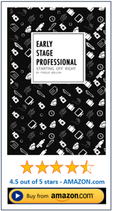- Wise Words -
making the transition from college to the workplace
by Colin Gallagher

Beginning your first “real” job can be a daunting challenge. Not only will you find yourself in an office environment for 40-plus hours per week, you’ll also likely being learning to manage new relationships and responsibilities in your personal life.
I started my career in New York City, about three months out of college and was truly “on my own” for the first time. Yes, I spent four years away from home at school but for the first time I had rent (and student loans) to pay and my livelihood was in my own hands. This can be an intimidating realization for any young person, and while I successfully made this life transition in some ways, there are certainly things I wish I had done differently. Here are four tips that might help get your career off on the right start. Adopt a healthy lifestyle. This is a simple yet effective tip to address outside of the office that can have a far greater impact on your career than you might think. In college, I rarely took classes that started before 10 AM, I usually had one or two weekdays off per semester, and of course, I enjoyed the occasional beverage. What these factors led to were an odd sleep schedule, which presented one of the greatest adjustments I faced when I entered the work world. As an entry-level employee, it is essential to bring your best self to the office every day, especially while making your first impressions and proving yourself to your new colleagues and managers. While you don’t need to start heading to bed at 8:00, the 2 or 3 AM nights should for the most part be behind you – coffee can only take you so far. Once I was able to improve my at-home lifestyle, I saw a noticeable improvement in both my demeanor and work performance. 
Be noticed – for the right reasons. Don’t be afraid to speak up. It can be intimidating to work with individuals who have years, or even decades, more experience than you do. But remember, your colleagues and managers know that you are not yet in a position to have the answers to every question you will face. Asking the right questions will not only show your managers that you're paying attention, taking your work seriously and eager to learn, you will also begin to make yourself known to others around the company with whom you do not work as closely.
Conversely, don’t make yourself known for the wrong reasons. No workplace is perfect, and there may be operational inefficiencies that affect your day-to-day responsibilities - operating systems may be outdated and there are definitely more streamlined ways to file expense reports, etc. While making thoughtful suggestions on process improvements can be a great way to show self-determination, understand that minor inefficiencies you have to deal with will likely not be a priority to management. It is important to accept that these annoyances are a reality of work life – and constantly harping on them will only serve to give you a reputation as a complainer. Build positive relationships with as many people as possible. This is, in my opinion, the simplest yet greatest piece of advice I can offer. I recently heard a quote that resonated greatly with me: “Opportunities do not float like clouds in the sky. They are attached to people.” I have repeatedly found this to be true. The professional relationships you build will go a long way towards determining your long-term career path. When the time comes to move on to another opportunity, former (and sometimes current) coworkers can be an excellent resource. Every serious outside opportunity I’ve had since taking my first job has come either as a direct result of being referred by a former coworker at a new company, or through a connection made by a coworker to their professional network. In the first few years of your career, it is difficult to differentiate yourself from the large numbers of applicants applying for the same position. Maintaining positive relationships with coworkers who have moved on is one of the best ways to get a leg up on the competition – hiring managers love personal recommendations. Just as a positive work relationship can benefit your career, a negative one can set it back. Regardless of where you pursue outside opportunities, you never know whom you may end up working with or for in the future. It is important not to burn any bridges, since in many industries, you will find that “everybody knows everybody else.” An overly negative experience could come back to haunt you long after you have forgotten the issue that caused it. Treat every day as a learning experience. I suspect this tip will apply at every stage of one’s career. I recently started a job at a new company after more than four years at the company where I started my career. The move has allowed me to view some of my previous successes and failures from a fresh perspective. Experiences that I treated as afterthoughts have proved valuable lessons as I’ve faced new challenges, with new personalities, in a new work environment. Whatever happens, your time as an early stage professional is just the first step in a long career. At this point in your career, celebrate your personal triumphs, and reflect on your miscues, but remember that both can serve you in a positive way as you move forward. Successfully building upon one’s accomplishments while learning from one’s mistakes will serve to make you a valuable employee as well as an attractive candidate when you decide to pursue future professional endeavors. I hope that you find these tips useful and if you would like to contact me with any questions / or want a bit of advice please email me at: [email protected]
Like this section? Why not send your own "Early Stage Professional:" advice and experience in? Just email it to: [email protected]
|


